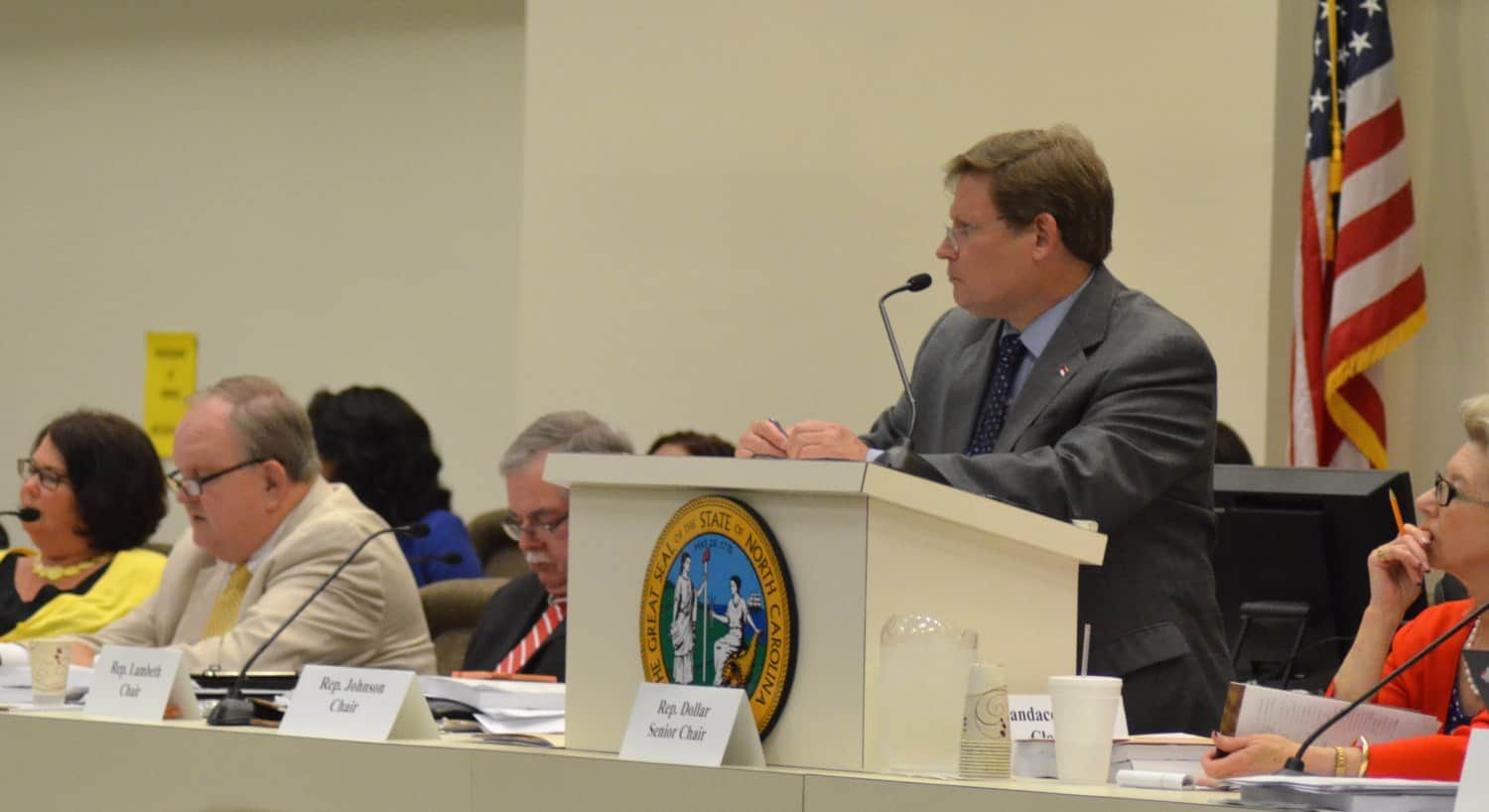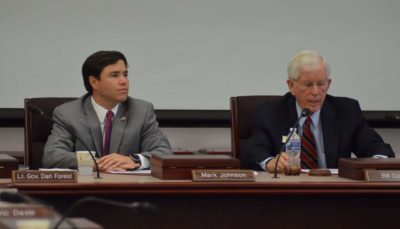The House budget successfully made its way through the House appropriations committee today, the first full day that all aspects of the spending plan were available to the public.
Portions of the budget, including education provisions, were unveiled last week, but big ticket items like teacher and principal pay were left off until the full budget was posted online last night.
Teacher pay
The budget proposal spends more than $180.9 million in the first year and $456.5 million in the second year on increases to teacher and principal pay. The average percent increase in teacher pay was touched on in a question during the committee meeting, but staff of Rep. Nelson Dollar, R-Wake, senior chair of the committee, gave more specifics in an e-mail.
The e-mail explained that rough estimates from the fiscal research division of the General Assembly show an average increase in teacher salaries of 3.3 percent in 2017-18 and between 9 and 9.5 percent over the biennium.
“The House plan was developed with a host of stakeholders as well as, I believe, a task force that had been put together that had met and been working on these issues for some time,” Dollar said in an interview after the committee meeting. “So we feel very good that we’re continuing the process of refining the structure of the pay plan and trying to make sure that we have addressed some issues that have been identified with the current structure.”
Mark Jewell, president of the North Carolina Association of Educators, said in an e-mail that Governor Roy Cooper’s teacher pay plan is preferable to the one laid out by the House.
“Governor Cooper set a strong budget blueprint for investing in our students and educators without raising taxes. The House salary proposal is better than the Senate’s for our school personnel paid on the state scale like teacher assistants and bus drivers and it recognizes the contributions of our experienced educators, but in many steps doesn’t even cover the costs of the health insurance premium increases,” he said. “The House plan also provides a cost of living increase for retirees, but it needs to be permanent. There is enough revenue to take the best of all the plans and make bolder investments in our public schools instead of tax cuts for the wealthy and corporations.”
In response to a question, Rep. Linda Johnson, R-Mecklenburg, said the House’s teacher pay proposal for this year is just a step on the way to the higher goal of reaching an average salary of $55,000 by 2020.
“That’s what we’re working towards,” she said. “And yes, there will be one (pay increase) every year until we reach that goal.”
The governor’s proposal would raise teacher pay an average of 5 percent in the first year and 10 percent over the biennium. In a press release, Governor Roy Cooper’s Communications Director Sadie Weiner echoed Jewell’s claim that Cooper’s proposal is better.
“At virtually every step on the schedule, teachers would receive a higher base salary and a larger increase under Governor Cooper’s plan,” she said. “Unlike the Senate and House proposals that do little for new and veterans teachers, Governor Cooper’s plan provides significant increases.”
Dollar expanded on his remarks about teacher pay in a press release that went out after the meeting.
“I’m very proud that the House continues to raise teacher pay and at the same time live within the budget, invest in core services and return savings to the taxpayers thanks to robust economic growth,” he said.
The Senate plan would increase average pay by 3.7 percent in the first year and 9.5 percent over the biennium. The Senate plan does not include pay increases for beginning teachers, and teachers with 25 or more years of experience will not receive raises. All teachers will get some raise under the House’s proposal.
Principal pay
Rep. Dollar’s staff said that fiscal staff could not estimate the average salary increase for principals because the salary schedule has been revamped. They could note, however, that the growth in the state-funded salary base — funding for base principal salaries — is about 11.9 percent in the first year and 17.4 percent in the second year.
The revamped principal schedule is calculated by combining years of experience with the average daily membership of the principal’s school and a percentage of the students in the school who get free and reduced price lunch. The salary schedules of teachers, assistant principals and principals are also tied together.
For instance, the basic principal salary schedule — not including the aspects of principal pay related to Average Daily Membership and free and reduced lunch population — is calculated by taking the monthly amount of pay for a regular teacher of 15 years, adding in 12 percent, and then adjusting according to the principal’s years of experience.
Assistant principals are paid the same as regular teachers with equivalent years of experience but with an additional 22 percent added on top.
Previous principal pay schedules were not tied directly to teacher pay schedules, leading to situations where, in some cases, teachers could make more money than the administrators who supervised them. The discrepancy was just one challenge reported in our earlier work on issues with the previous principal pay schedule.
In the House’s principal pay plan, longevity pay is eliminated for principals but continues for assistant principals.
Katherine Joyce, executive director of the North Carolina Association of School Administrators, said her organization is still analyzing the difference between the House and Senate principal pay plans and trying to figure out which version deserves advocacy.
“We do like the House’s proposal to maintain the links and career progression between pay for teachers, assistant principals and principals as well as recognizing years of experience in principal base pay,” she said in a text message. “We commend both chambers for making principal pay a high priority and look forward to working with them to move our principals up significantly in pay rankings in the Southeast and the nation.”
The Senate budget proposal funds more than $28 million of increases in principal and assistant principal salaries for what Senate leadership called a substantial increase in pay. The Senate proposed principal schedule has a base that pays principals according to the Average Daily Membership of their schools. They would also have the opportunity for performance related bonuses.
Under the Senate proposal, assistant principals would receive the same salary as a regular teacher with equivalent years of experience plus 13 percent. The Senate budget also revamped the principal pay schedule, making it difficult to ascertain average salary increases for these school leaders. The Senate’s plan eliminates longevity pay for both principals and assistant principals.
Questions and amendments
In the morning, lawmakers had the opportunity to ask questions. Rep. Beverly Boswell, R-Dare, asked about the proposed increase to textbooks. The House budget provides about $10.3 million in additional funding for textbooks and digital resources in the first year of the biennium, bringing the net appropriation for that year up to $65.8 million. Boswell was concerned that local districts could use that money for other purposes, since school districts have the ability to transfer money from some line items — including textbooks — to others.
”I don’t want them to come back and say that we did not fund these resources,” she said.
Rep. Jeffrey Elmore, R-Wilkes, pointed out that the House budget proposal includes a provision that requires districts to publicly document when they transfer a certain level funds from one allotment to another.
After a presentation on all aspects of the budget in the morning, the committee took up amendments in the afternoon.
One amendment by Rep. Hugh Blackwell, R-Burke, added a section to the portion of the budget on principal pay. The amendment lays out a non-binding “intention” by the General Assembly that if teacher pay increases, principal pay will increase along with it.
“We are like dead last, 50th in the nation and have been, in principal pay,” Blackwell said. “I’m excited that the schedule in here is making a good start at getting us out of that hole.”
Part of the process for calculating principal pay in the House budget is that the state takes the monthly amount of pay for a regular teacher of 15 years and then adds 12 percent for principals. The statement of intention lays out that the 12 percent differential will continue to apply when teachers get raises.
Rep. Rosa Gill, D-Wake, tried and failed to pass an amendment that she also proposed in the House education appropriations committee last week. The amendment would have taken the additional money in the budget for the opportunity scholarship program and put it in the classroom teacher allotment for grades K-3.
“We know that the class size has been changed,” she said. “We also understand the extra responsibility they have of making sure that all students can read by 3rd grade.”
She referred to impending changes in class size mandated by the General Assembly that go into partial effect this coming year and full effect in 2018-19. The class size restrictions will eliminate flexibility in funding that local districts often use to fund extra curricular teachers, like those who teach art, physical education, and art.
Gill said the extra money for opportunity scholarships — $50 million over two years — is not necessary, and she said staff told her the opportunity scholarship program is spending an average of about $21 million each year. She said taking the extra money would still leave enough money in the opportunity scholarship program to cover that average cost.
But Blackwell disagreed, saying that the opportunity scholarship program has faced litigation —which has since been resolved but could have slowed the program’s growth. He also said that parents may sometimes not choose the program because of uncertainty about its funding due to how long it takes the state to put out its budgets.
“We have rapid growth in applications that are coming in,” Blackwell said. “This is not the time to cut back on this program.”
Elmore also argued against the amendment, saying that the state is going to be analyzing the actual needs for teachers in districts, including when it comes to extracurricular teachers, and developing a new plan for classroom teacher allotments going forward.
“It’s very premature at this time to shift money to that when we’re developing the process,” he said.
Beyond amendments and questions, there was no debate on the motion to give a favorable vote to the budget bill. The House budget goes to the floor tomorrow.
Go here for the budget bill.
Go here for the money report.



